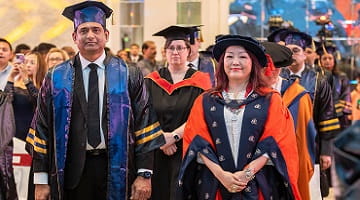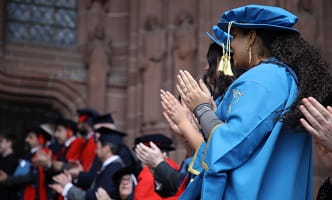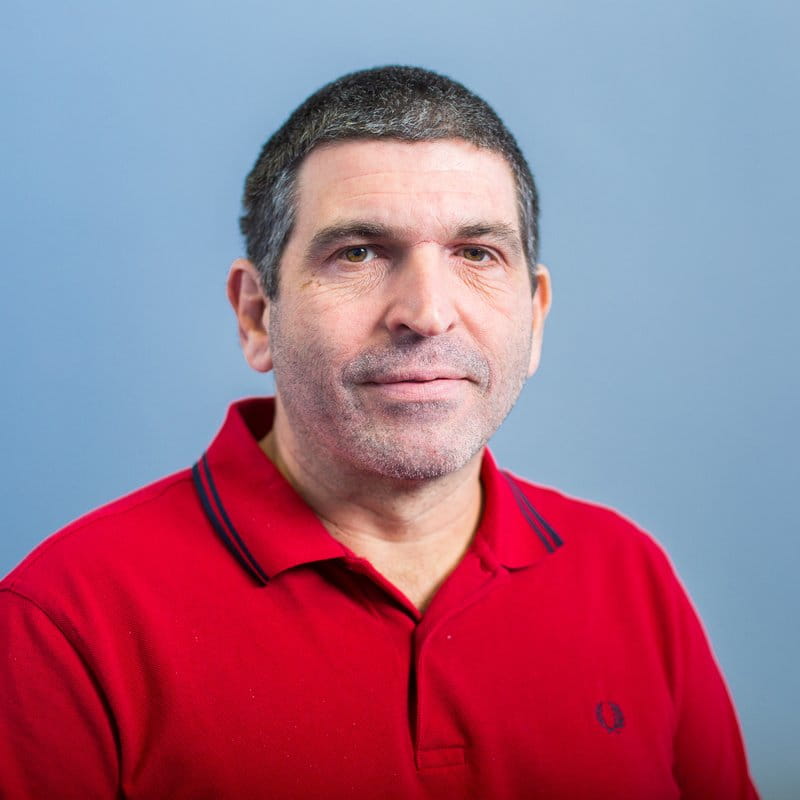2025/26 entry Applications also open for 2024/25
MSc Virtual and Augmented Reality
About this course
A practical, pioneering MSc course, focusing on immersive technology tools and techniques for the development of virtual and augmented reality systems.
Please note that this programme has been suspended for 2024 entry. We will not be accepting applications for September 2024.
- Embark on this newly developed course focussing on a topic of great recent and predicted growth
- Learn how to use and develop a range of tools, techniques and systems for Virtual/Augmented/Mixed Reality
- Experience one of the first MSc courses in the UK to focus on the development of VR/AR applications and systems development
- Benefit from the experience of academics with substantial experience in 3D graphics, Computer Games, Virtual Reality and Augmented Reality and with substantial industrial collaboration
A pioneering MSc in the UK that will prepare graduates for a career in industry or academia. Virtual and Augmented reality content is expected to expand in all domains, from sport and leisure to training, entertainment, advertising, health applications, tourism and many more.
The programme focuses on the development and application of tools and techniques of Virtual Reality and Augmented Reality with a view to producing capable professionals to work in this field.
Dedicated Facilities
A dedicated Lab with high performance workstations, as well as specialised hardware and software is used for the practical work in this programme. Each student is assigned one workstation for the duration of the programme, including the final Dissertation Project.
Career Prospects
There has been sustained growth in labour market demand for workers with skills in the subject in recent year, and it is anticipated that application of Virtual/Augmented Reality technologies will become more mainstream in the future
This is an exciting area with applications in a variety of industrial domains, from training, advertising and marketing, urban planning, medical therapies, computer games, and many others.
Professional body recognition
BCS, the Chartered Institute of IT—Partial CITP
Fees and funding
There are many ways to fund postgraduate study for home and international students
Fees
The fees quoted at the top of this page cover registration, tuition, supervision, assessment and examinations as well as:
- library membership with access to printed, multimedia and digital resources
- access to programme-appropriate software
- library and student IT support
- free on-campus wifi via eduroam
Additional costs
Although not all of the following are compulsory/relevant, you should keep in mind the costs of:
- accommodation and living expenditure
- books (should you wish to have your own copies)
- printing, photocopying and stationery
- PC/laptop (should you prefer to purchase your own for independent study and online learning activities)
- mobile phone/tablet (to access online services)
- field trips (travel and activity costs)
- placements (travel expenses and living costs)
- student visas (international students only)
- study abroad opportunities (travel costs, accommodation, visas and immunisations)
- academic conferences (travel costs)
- professional-body membership
- graduation (gown hire etc)
Funding
There are many ways to fund postgraduate study for home and international students. From loans to International Scholarships and subject-specific funding, you’ll find all of the information you need on our specialist postgraduate funding pages.
Please be aware that the UK’s departure from the EU may affect your tuition fees. Learn more about your fee status and which tuition fees are relevant to you.
Employability
Further your career prospects
LJMU has an excellent employability record with 96% (HESA 2018) of our postgraduates in work or further study six months after graduation. Our applied learning techniques and strong industry connections ensure our students are fully prepared for the workplace on graduation and understand how to apply their knowledge in a real world context.
Graduates from this programme can expect to secure technical employment in a wide range industries such as: media, advertising and games, as well as developing applications for health, tourism, industrial training and simulation, building and urban planning, and many others.
The student experience
Discover life as a postgraduate student at LJMU.
News and views
Browse through the latest stories and updates from the University and beyond
Course modules
Discover the building blocks of your programme
This course is currently undergoing its scheduled programme review, which may impact the advertised modules. Programme review is a standard part of the University’s approach to quality assurance and enhancement, enabling us to ensure that our courses remain up to date and maintain their high standard and relevancy.
Once the review is completed, this course website page will be updated to reflect any approved changes to the advertised course. These approved changes will also be communicated to those who apply for the course to ensure they wish to proceed with their application.
Your programme is made up of a number of core modules which are part of the course framework. Some programmes also have optional modules that can be selected to enhance your learning in certain areas and many feature a dissertation, extended report or research project to demonstrate your advanced learning.
Core modules
Research Methods
20 credits
The aim of this module is to develop your knowledge of effective and academic research design at Masters level and provide guidance on the purpose and design of literature reviews; the use of theory; writing strategies; citation and ethical considerations. It provides an understanding of how the range of qualitative, quantitative and mixed method data approaches can be most appropriately applied. It provides the knowledge and research skills you need to:
- establish the most effectual research design and method for the dissertation project and write a successful research proposal
- prepare for the project module and for a possible future research career
Project Dissertation
60 credits
This module aims to develop your ability to plan, execute and report in-depth on a major investigation.
Software Engineering Concepts for AR/VR
20 credits
This module will introduce you to the Mixed Reality domains, providing both a theoretical perspective on the classification of virtuality and reality, and the associated hardware and software requirements.
Students will be exposed to the current state of the art in AR/VR development by evaluating the hardware, software and middleware requirements of a modern AR/VR solution.
Students will learn the software engineering principles and core algorithms which are used to implement Augmented Reality/Virtual Reality applications using aspects of a modern game engine.
We will focus on the architectural layers of a modern game engine and their relevance to building AR/VR Solutions in tandem with how we integrate AR/VR SDKs into a modern engine and deploy software to AR/VR supporting devices.
We will look at various architectural design strategies and provide in-depth coverage of various core modules and tiers within a game engine. This involves applying realtime programming techniques and data structures, and practically applying them to develop mixed reality applications.
Virtual Worlds for Shared Space Technologies
20 credits
This module teaches fundamental mathematical techniques such as numerical calculus, analytical geometry, linear algebra and angular concepts, with a focus on practically constructing three-dimensional virtual worlds. Industry standard Digital Content Creation tools and game engine level editing software are used, mathematical concepts of translation, rotation and scaling to 3D Meshes are applied and materials, post processing, camera and scene construction techniques are used to build immersive, believable virtual spaces for use with the shared space technologies.
User Experience Design for Immersive Technology
20 credits
This module covers a systematic approach to the analysis, modelling, design, implementation and evaluation of immersive technologies covering Virtual Reality (VR), Mixed Reality (MR) and Augmented Reality (AR). You will study and practice the material via lectures and tutorials and then proceed to a problem-based approach to the design, prototyping and evaluation of an immersive experience.
Advanced Topics in Augmented Reality
20 credits
This module explores the theoretical and technical domains that underpin the current state of the art in Virtual Reality development. From fundamental fields of study such as Data Visualisation and Neuro Perception, through to hardware concerns, visual fidelity and real-time rendering approaches required to achieve smooth, immersive environments, you will evaluate and practically apply the latest development techniques to produce a Virtual Reality Visualisation system.
Teaching
An insight into teaching on your course
Students should expect between nine and 12 hours of contact per week, in addition to an average of approximately 30 hours of self-study per week throughout the academic year. In the summer term, you will work solely on your project, which has an expected workload of 600 hours.
Our academic staff are leaders in their research fields and will provide you with a platform to enter technology competitions, attend conferences and further your research opportunities.
Assessment
How learning is monitored on your programme
To cater for the wide-ranging content of our courses and the varied learning preferences of our students, we offer a range of assessment methods on each programme.
Assessment methods on the programme comprise: coursework, examinations, laboratory work, reports, project work and presentations.
Course tutors
Our staff are committed to the highest standards of teaching and learning
Dr Rubem Pereira
Programme Leader
Before joining the LJMU team, Rubem completed his PhD in Computer Network Performance Modelling in 1997. In the same year he started working at LJMU. He has been a reader in Multimedia Networks and became programme leader for MSc programmes in Computing in 2003. He has also participated in many externally funded projects, supervised PhD students and organised national and international workshops and conferences. Rubem's special areas of interest include: network technologies, distributed systems, video encoding and streaming, the future of Internet, modelling and performance analysis and evaluation of computer systems.
School facilities
What you can expect from your School
Studying at the Byrom Street site in the City Campus, which has recently enjoyed a £6 million investment, you will have access to state-of-the-art laboratories and teaching facilities.
A newly developed, specialist Lab comprising High Spec Workstations and Immersive Technology tools e.g. headsets for Virtual Reality is fully dedicated to the MSc students in the Virtual and Augmented Reality Programme.
We also have over 150 high performance computers including PC/ Linux Workstations and Networked Multimedia PCs for general use, in addition to the campus computing cluster.
Entry requirements
You will need:
Qualification requirements
Undergraduate degree
- an undergraduate degree in a cognate subject area
or
- an undergraduate degree in a non-cognate subject area when supplemented by relevant skills and / or experience
or
- degree equivalent professional qualifications, e.g. BCS Graduate Diploma in IT
or
- a HND plus a minimum of three years relevant professional experience
International requirements
-
IELTS
IELTS 6.0 (Minimum 5.5 on each component)
Further information
- Extra Requirements
-
RPL
RPL is accepted in this programme
The University reserves the right to withdraw or make alterations to a course and facilities if necessary; this may be because such changes are deemed to be beneficial to students, are minor in nature and unlikely to impact negatively upon students or become necessary due to circumstances beyond the control of the University. Where this does happen, the University operates a policy of consultation, advice and support to all enrolled students affected by the proposed change to their course or module.











